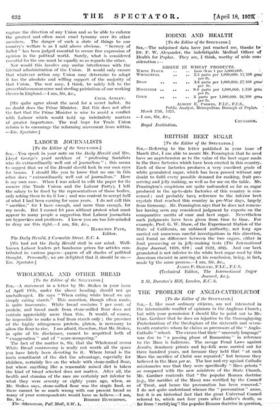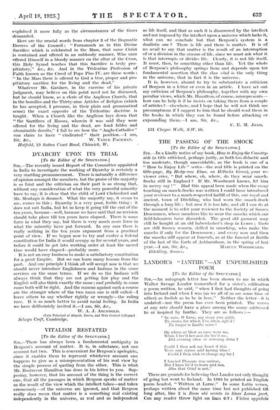THE PROBLEM OF ANGLO-CATHOLICISM
[To the Editor of the SPECTATOR.] Sin,—I, like most ordinary citizens, am not interested in the interminable conflict of opinions in the Anglican Church ; but with your permission I should like to point out to Mr. Chas. Gardner that he does an injustice to the thoroughgoing Protestantism of the theologians of the sixteenth and seventeenth centuries whom he claims as precursors of the " Arig,loCatholic " school. The excuse that their" unseemly language" was due to a passing phase of Romanism " in reference to the Mass is ludicrous. The savage Penal Laws against Jesuits, Seminary priests and lay-folk were carried out for three hundred years, not because they held that "at each Mass the sacrifice of Christ was repeated," but because they believed in the Mass per se. The hue and cry against Catholic missionaries was that they were specifically "Mass priests" as compared with the new ministers of the State Church. Mr. Gardner contends that "the popular Roman doctrine (e.g., the sacrifice of the Mass) was rectified by the Council of Trent, and hence the provocation has been removed." I do not quite understand whence the " provocation " arose, but it is an historical fact that the great Universal Council referred to, which met four years after Luther's death, so far from `!. rectifying 't the popular Roman doctrine in question,
explained it more fully as the circumstances of the times demanded.
Here are the crucial words from chapter 3 of the Dogmatic ' Decrees of the Council : "Forasmuch as in this Divine Sacrifice which is celebrated in the Mass, that same Christ is contained and offered in an unbloody manner, Who once offered Himself in a bloody manner on the altar of the Cross, this Holy Synod teaches that this Sacrifice is truly propitiatory," &c., &c. And in the Tridentine Profession of 'Faith known as the Creed of Pope Pius IV. are these words : "In the Mass there is offered to God a true, proper and propitiatory sacrifice for the living and the dead."
Whatever Mr. Gardner, in the exercise of his private judgment, may believe on this point need not be discussed, but he should know, as a cleric of the Anglican Church, that in the homilies and the Thirty-nine Articles of Religion (which he has accepted, I presume, in their plain and grammatical sense) the exact opposite of the Tridentine doctrine is taught. ' When a Church like the Anglican lays down that "the Sacrifices of Masses, wherein it was said they were offered for the living and the dead, are fond fables and abominable deceits," I fail to see how the " Anglo-Catholics " can claim to have " vindicated " their position.—I am, Sir, &c., W. VANCE PACKMAN. Hatfield, 19 Sutton Court Road, Chiswick, IV.











































 Previous page
Previous page